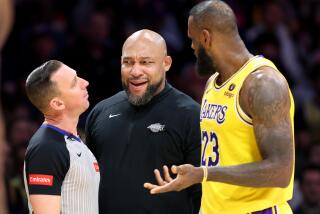Jury Was Still Out on Lewis : Basketball: Third opinion was being sought from Southern California physicians on NBA player’s heart.
Reggie Lewis did not jeopardize his health for basketball, his widow and physicians said Thursday in their first public statements about the Boston Celtic captain’s sudden death Tuesday.
“Reggie did everything that he could to avoid this day coming,” Donna Harris Lewis, Reggie’s pregnant widow, said in a statement.
Harris Lewis and a group of Southern California heart specialists decided to discuss the tragedy to dispel the belief that Lewis had not taken medical advice seriously.
Lewis collapsed Tuesday during a light workout at Brandeis University in Waltham, Mass., and died two hours later as emergency room personnel tried to revive him.
“It is important that everyone know that Reggie was very serious and focused about his health,” Harris Lewis said.
She said her husband’s physicians decided to let him compete again only if the Celtics provided at all practices and games a cardiologist and a defibrillator, an instrument that can shock an irregularly beating heart back into a regular rhythm. The Lewises planned to meet with team officials and make that request the week of Aug. 10, she said.
Lewis’ heart was to have been monitored next week as he played in Baltimore, his hometown. He decided against being monitored at the team’s rookie/free-agent camp earlier this month because of the circus environment it would have created, Harris Lewis said at a news conference in Boston.
Cardiologists were hoping to gain clues as to why Lewis suffered from a fainting spell in the Celtics’ playoff opener against the Charlotte Hornets on April 29. Lewis was to have worn a Holter monitor--a device that gauges abnormal heart rhythms--during workouts.
“If we thought he couldn’t play basketball anymore, he wouldn’t play,” said Richard F. Wright, a cardiologist at St. John’s Hospital and Health Center in Santa Monica. “Reggie said he just wanted to find out what was wrong.”
Wright was among four Los Angeles-area specialists who examined Lewis in early June, it was revealed Thursday. Although they concluded that Lewis had a distinct abnormality in the apex region of his heart, they were unable to determine if he suffered from a life-threatening heart disorder or a relatively benign fainting disorder known as neurocardiogenic syncope.
The Southern California physicians were asked to examine Lewis after he had received conflicting diagnoses from two groups of Boston-area experts.
Nicholas V. Diaco, a St. John’s cardiologist who assembled the third group, said he was contacted by Lewis’ agent, Jerome Stanley of Los Angeles.
Diaco said a week of testing failed to provide a definitive diagnosis. But Diaco said Lewis was aware of the complexity of the situation and the risks he faced.
“Reggie had not made his decision to return to basketball because his testing was not complete,” Harris Lewis said.
“The doctors concluded (that), although they believed that he could eventually return to controlled, conditional, competitive basketball, they did not think that he should do so until he had undergone a monitoring of his heart function while playing competitive basketball.”
Assisting Diaco and Wright were John Michael Criley, medical director of St. John’s Heart Institute and a UCLA professor, and William Stevenson, director of electrophysiology at UCLA.
The Massachusetts state medical examiner’s office said results of studies of Lewis’ heart and other organs might not be available for several weeks. Usually, pathologists examine organs for size and structural damage in a effort to determine cause of death in such cases.
Diaco said an autopsy would not necessarily offer definitive answers.
“There’s a distinct possibility of not knowing,” he said.
The L.A. cardiologists were unable to duplicate a fainting episode during treadmill tests to determine whether Lewis suffered from a condition that resulted in fatal arrhythmias, or irregular heart rhythms.
“The crux of the issue is, we didn’t know why he passed out,” Wright said. “This came as a shock. He never had any episodes when doing non-strenuous activity.”
Although he was originally suspected of suffering from focal cardiomyopathy, a disease of the heart muscle, Lewis sought a second opinion.
That opinion was greeted with controversy when it contradicted the original diagnosis by a group of experts affiliated with New England Baptist Hospital in Boston.
Instead of having a life-threatening condition, he might be suffering from a neurological disorder, Lewis was told by a team of physicians from Brigham and Women’s Hospital in Boston.
The lead physician, Gilbert Mudge, director of clinical cardiology at Brigham and Women’s, has refused comment since Tuesday’s incident.
Diaco said he consulted with Mudge regularly since June and spoke to the Boston physician recently.
“He was very broken up,” Diaco said.
Harris Lewis said she and her husband “thoroughly and completely understood the conflicting opinion of Dr. Mudge.”
She said they sought a third opinion because of the disagreement and the pressures in the Boston area.
“Dr. Mudge’s opinion was the best guess until we were able to duplicate the symptoms. . . ,” she said.
Stevenson, the UCLA electrophysiologist, said he agreed with Mudge’s conclusions, but cautioned that further tests were needed.
Lewis reportedly was planning to scrimmage with some college players the night he died. Diaco said Lewis would not have engaged in dangerous activity, such as a strenuous scrimmage “because he knew better.”
Services for Lewis will be Monday at Matthews Arena at Northeastern University, his alma mater.
More to Read
Go beyond the scoreboard
Get the latest on L.A.'s teams in the daily Sports Report newsletter.
You may occasionally receive promotional content from the Los Angeles Times.










